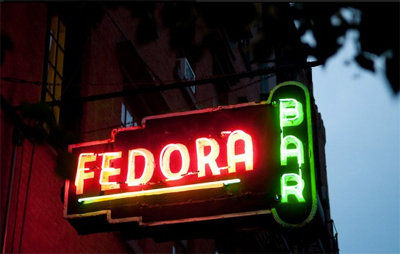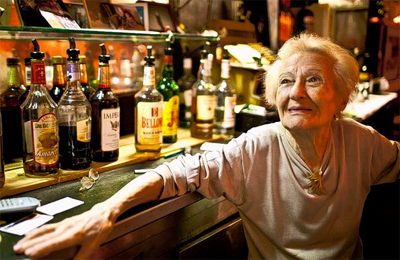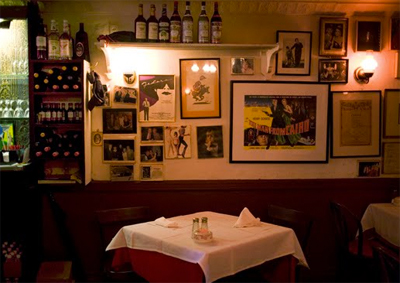This article was originally published in WestView, a print publication in New York’s West Village.
Could a trained elephant slip through a bustling West Village dining room without so much as tipping a glass of red wine?
With business thriving in the 1960s, Fedora Dorato weighed the trade-offs of expanding the namesake restaurant she opened in 1952. Doing so meant it would double as an entryway for her neighbor’s elephant, Champagne. According to Ms. Dorato, the pet’s owner called her an “ass” for turning down the deal.
While Champagne never darkened Fedora’s door at 239 West Fourth Street, a thinning legion of regulars continues to visit this untouched window into the past. The tin ceiling, the rotary payphone, the wooden bar Ms. Dorato’s father-in-law once stood behind are not throwbacks to a bygone era; they never left.
On July 25, nearly 60 years after Ms. Dorato and her late husband Henry served their first plate of prawns Florentine, her staff will dish up their last.
Medical procedures have done little to ease Ms. Dorato’s relentless back pain, and she is finding it increasingly difficult to walk, let alone pour cocktails five nights a week. Still, the 89-year-old’s watery blue eyes dance when she speaks of her restaurant.
“I love the business. It’s very hard work if you’re fussy. I’m fussy,” said Ms. Dorato. “Sometimes a tablecloth is crooked. I pick it up and start from scratch.”
Since her husband passed away in 1997, Ms. Dorato has been in charge. While the dining room is quiet these days—patron Bill Shubick remembers a line to get in on his birthday in 1957—it remains a stubbornly unchanging source of camaraderie for a devoted group of silver-haired New Yorkers.
One Saturday night recently, Jerry Farley, a regular since 1974, entered the ground-level door carrying a martini glass in bubble wrap.
He unwrapped the glass at the bar. “Gin. I’m into gin tonight, a couple of olives,” he said to George Malmend, one of two waiters. Ms. Dorato sat nearby, resting her legs. Mr. Farley made his way to the sole round table—the “death table” he joked. It’s where he spent countless Saturday nights with friends who are no longer alive.
“This was an anchor for everybody,” he said. “Our friendship revolved around Fedora. When I come in here, I feel young again. Everything is just as it was.”
Later that evening, Rollerena—legendary in the 1970s for roller-skating with a magic wand in hand—walked in wearing a veiled hat, cat eye glasses, and baby blue fingerless lace gloves. The self-proclaimed “Queen of Studio 54” arrived after 8 o’clock, missing the warm applause that greets Ms. Dorato as she makes her entrance.
The petite restaurateur, though modest, adores the traditional ovation. “Sometimes I step back out just so I can hear it again,” she admitted with delight.
Ms. Dorato enters her establishment the way she wants everyone to feel: welcomed. Such a cordial atmosphere was difficult to find for gay men in the 1950s and 1960s. Villager Michael Rooney first came to Fedora more than 40 years ago with another young man. “She made everybody feel special,” he said. “She doesn’t bat an eye. It’s something everybody strives for but very few people accomplish.”
Ms. Dorato’s outlook is uncomplicated. “If you’re nice, I’ll go along. That’s about it,” she said.
After Mr. Farley finished his martini in his custom glass, he stepped outside to smoke a Cuban. “This is the best part of my night,” he remarked, grinning under the neon green and pink sign reading Bar Fedora. “And this is such a great place—we should all get together and buy it.”
According to Ms. Dorato, Gabriel Stulman, who opened Joseph Leonard in the West Village last August, will be renting and renovating the space. She said he intends to keep the neon sign and the name Fedora intact. Mr. Stulman declined to be interviewed.
Younger customers do not often appreciate the restaurant’s storied history. One review on Yelp equated a visit to “entering an episode of the Twilight Zone or booking a room at the Bates Motel.”
The longevity of the establishment is a feat considering Ms. Dorato had to cajole her husband into opening Fedora (the name was his idea, she said).
“Henry didn’t like the restaurant business. He grew up in it,” Ms. Dorato recalled. When he was a child, his father ran a place called Charlie’s Garden in the space Fedora now occupies. It was a speakeasy in the 1920s.
It took a couple of years for Fedora to blossom, its growth aided by model Burke McHugh, who took over Ms. Dorato’s role as host for a few months in 1954. “My husband fired me,” she deadpanned. “I resented him at first.” Meanwhile, Mr. McHugh sent postcards to hundreds of neighborhood friends, inviting them in.
As Fedora caught on, celebrities including Kay Francis and Julie Andrews made appearances. Ms. Dorato remembers the time her husband mistook Lauren Bacall for Lucille Ball. Ms. Bacall’s response now hangs on the wall, next to Hollywood portraits, family photos, and a poster of the Italian opera Ms. Dorato was named after. Ms. Bacall’s note reads: “Henry, Never mix celebrities. Nice food.”
The menu has changed little over time—Italians standards offset classics like ice box cake. Ms. Dorato still prepares some meals. “I never had a cookbook,” she remarked. Born in Florence, Italy and raised in Greenwich Village, she grew up poor. Her mother didn’t let the children help in the kitchen, lest they ruin the food.
“Cooking is fine. I find it very relaxing,” said Ms. Dorato. “But my joy is mixing in with the people.”
Her customers frequently bring in fresh flowers. Red roses are Ms. Dorato’s favorite. As she winds down nearly six decades of running her namesake establishment, she admits to being ready for a break.
“I like my little place, I really do. But my body can’t take it anymore,” she said. “That’s the end of my story.”
Ms. Dorato will remain close by, however. She lives on the third floor of the brownstone. Her son runs his dental practice in the building as well.
For Ms. Dorato’s regulars, the coming days at Fedora will mark the end of an era with their favorite restaurateur—a woman who welcomed them long before many of her neighbors did and who treats newcomers just as warmly.
“She was always ahead of her time,” said Mr. Rooney before paying his bill. “If the whole world looked at things the way she did, it would be such a pleasant place.”





